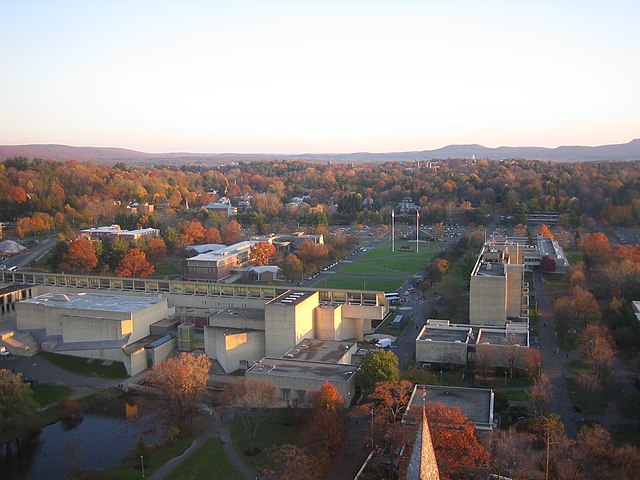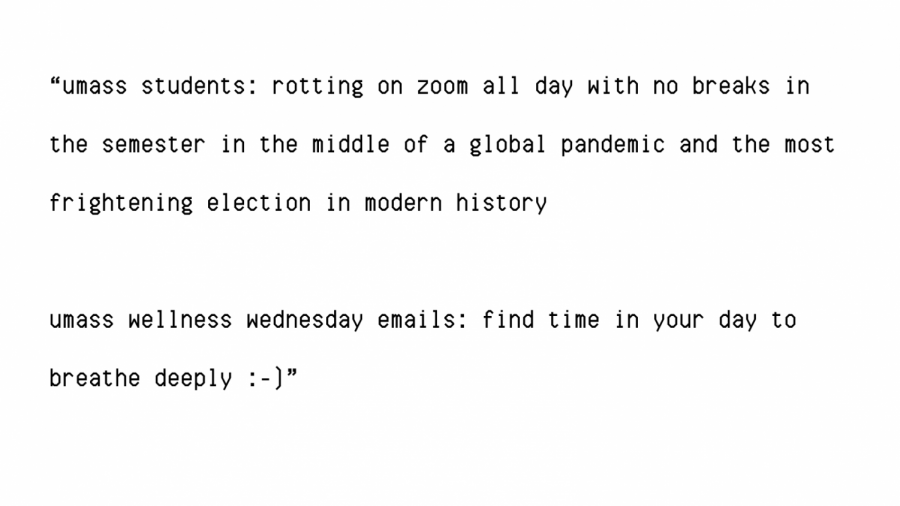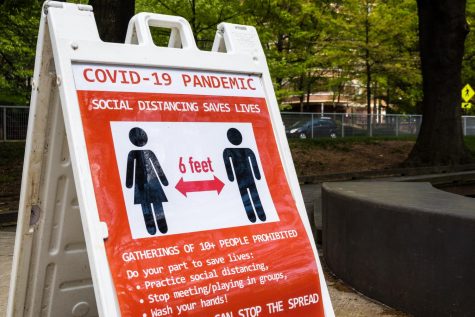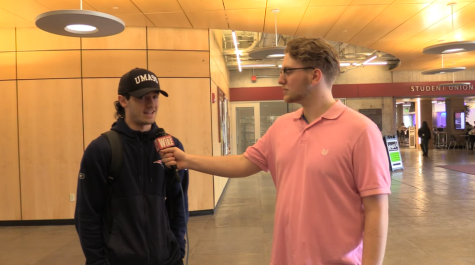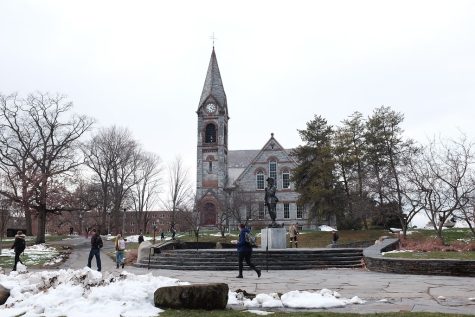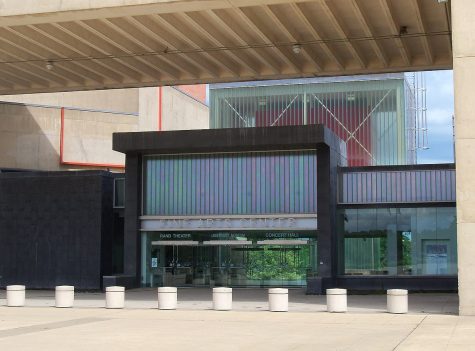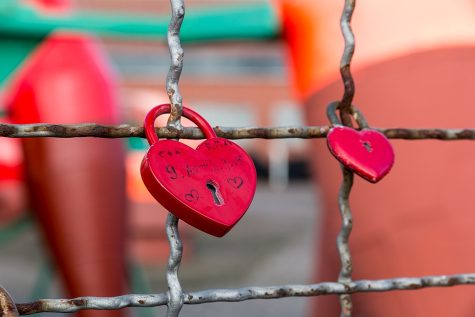Was this the worst semester in UMass History?
Students mental health collapses as the third virtual semester comes to a close
Content Warning: This article mentions suicide, mental health, and suicidality.
As college students prepare for finals, the month of May represents a little light at the end of a dark tunnel. May is mental health awareness month but for several University of Massachusetts Amherst students, their mental health has needed recognition long before finals week.
In the third semester of COVID courses and online fatigue, UMass Amherst students seemed to struggle more than ever. The global pandemic continues to rage but in a decision to limit student travel during the semester, university administrators decided the best course of action would be to shorten the semester. By starting on Feb. 1, nearly two weeks later than previous years, and ending on May 6 without a break, the semester, which was normally alleviated by spring break and President’s and Patriot’s Day holidays, suddenly felt jammed packed.
Two “Wellbeing Wednesdays,” scheduled for Feb. 17 and April 14, replaced the traditional week-long mid-semester break. On these days, classes were not held and instructors were asked to not assign tests or quizzes but it’s unclear how rigidly this decree was followed. Each Wednesday since Aug. 26, Betsy Cracco, Ph.D. Executive Director, Campus Life and Wellbeing, has sent a “Wellbeing Wednesday” email. Although well-intentioned, several students expressed distaste for the emails in conjunction with their unending stream of classwork during the greatest catastrophe in the past 100 years.
Across Twitter and Reddit, UMass students expressed outrage:
Spending hours scrolling and scrolling through various replies and retweets like the ones above about the pain of the 2021 semester is commonplace. The rapid desensitization to societal critique or outspoken trauma has become an isolating factor in the very online year COVID-19 forced everyone into, students especially. Yet when fingers stop flicking the screen downward and pause at a single tweet, a single Reddit post, broken down and analyzed, the truth behind the screen is heartbreaking. Three student stories illuminate these extreme challenges. Names have been altered for the purpose of anonymity.
. . .
Alex has endured anxiety that was not only crippling but halted their day-to-day activities almost entirely. Their previous history with mental health was minimal but the first-year student experienced unshakeable panic attacks. 16 credits and failing half of them, the electrical engineering student was pointed in the direction of tutors and the Center of Counseling and Psychological Health at UMass, which offers free therapeutic and psychiatry sessions to UMass students. “I met with a therapist from CCPH not too long ago and to be completely honest it was one of the worst experiences of my life. I dreaded ‘going to her’ even though it was over Zoom. She was essentially just saying how bad she felt for me and that she’s sorry I’m going through this but didn’t really give me any other advice as to what to do to get ahead of the anxiety, stress, and depression I’ve developed over the semester,” the freshman said.
As the stresses of the semester ballooned, several mornings found this student having “full-blown anxiety attacks” and “absolutely break down…for hours.” Unchecked, these conditions only worsened. Early one morning during the week of April 14, the pressures of perfection in a pandemic took over the engineering major. They had fallen a month behind schedule in most classes and took drastic measures. “I still had this pain of everything on top of me and I took a double dose of my medication thinking it would clear my mind.” It didn’t.
One hour into the double dosage, the student began sweating profusely and failed to reach a Triage nurse when calling University Health Services. They dialed 911 and were admitted to the ICU of Cooley Dickinson Hospital. This student was informed by medical staff that due to increased anxiety, poor mental health resulting from academic stress and their new living arrangement, they were experiencing panic attack disorder “that were exacerbated by the meds.” Alex describes their experience at Cooley Dickinson as petrifying. “In the times I wasn’t given doses of anti-anxiety meds through my IV it felt like I couldn’t breathe. I couldn’t talk, I couldn’t move. I had no control over my body. My heart rate was through the roof, my blood pressure was incredibly high and I was hyperventilating,” they said.
Alex’s experience isn’t unusual. While their behavior is not necessarily suicidal, suicidality in individuals from 11 to 21 years old rose 1.60 times from the last survey in March 2019 according to “Suicide Ideation and Attempts in a Pediatric Emergency Department Before and During COVID-19.” Inside Higher Ed reported new information from the Center for Disease Control that one in four individuals between the ages of 18 and 24 considered suicide.
Another freshman and engineering major, Jane, could not understand the university’s decision to offer students on-campus residence. “Bringing students back on campus was the dumbest thing UMass could’ve done. We’re called ZooMass for crying out loud! I lived in Amherst off campus, and even in the fall when the campus was desolate the off-campus UMass population singlehandedly drove the increase of Covid cases in the town.” She referred to the university’s email attempts at quelling the rising cases as “pathetic.”
When a sudden health condition upended Jane’s semester, she felt barricaded by guilt when her affliction made her unable to do work. “I got an email from a professor that made me cry. It was like one sentence worth of information, but it was sort of passive-aggressive… I am just regaining my strength, but now I fear reaching out to my professors even though I have a valid excuse.” Overcome with guilt, Jane was trapped in a cycle of self-blame and a recognition that her situation, while individual, may not be unique. “It’s hard to communicate and reach out with people, especially during this time, because it feels like everyone’s kind of going through the same thing, ” she said.
Student burnout was a massive part of why social media became a place to vent. Jane found herself surprised by how student burnout compiles on top of itself, similar to how classwork compiles. “It’s like you miss one assignment, and then you miss another, and they all build on each other because a lot of the work is cumulative.” She believes professors couldn’t understand this surmounting stress because the behaviors of paralyzation appeared lazy. “From their point of view, it’s you’re just not turning in your work. Well, it’s like, I’m here thinking about all the work I have to do. And I’m so paralyzed by all the things I have to do. And it’s kind of hard to get out of, it’s not really as hard as you probably think it is.” One professor, in particular, pushed Jane to the edge when she requested a deadline extension. “It was just an email they sent where it was all lowercase, no subject line. I was like, dang, they’re fed up. I just started crying. I felt so guilty and sad because of it,” she said. Jane plans to transfer in the fall.
Both the ticker tape death counter witnessed globally and the national instances of racism and systemic hate, have rippled shockwaves through the internet. This phenomenon of pain experienced through bearing witness to or hearing the traumatic experiences of others is referred to in social work as second-hand trauma, or trauma exposure response.
Raven, a journalism student, experienced a dark culmination of mental health struggles and second-hand trauma. At the start of the spring semester, Raven’s roommate attempted suicide. Understandably, this incident left Raven traumatized and isolated when her roommate was removed from her dorm. These feelings of isolation resulted in a drop in her grades and a trend that her advisors took note of. “I’ve been failing most of my classes since and the only outreach I’ve received is from my advisors telling me my grades suck,” Raven said.
Exhausted by an inability to meet the expectations of her professors and advisors, Raven stands at a bleak roadblock before her final year of undergrad. While she hopes to improve in the fall, the lack of empathy she’s received this semester has left her at a complete loss. “I’m going into my senior year and UMass is making it harder and harder to love my college experience. I truly do love it here, but it’s starting to feel less than worth it.”
As the stress of finals peaks, only to descend in a week, it’s unclear what future semesters will be like for these students. A year online has impacted their trust of professors, the university and other students. Student burnout has cost each one of them a piece of their mental sanity and even dignity. While Raven and Alex prepare for a fall semester in person at UMass and Jane looks forward to transferring, many other students are picking up the shards of a shattered year.
If you are struggling with mental health on or off-campus, contact CCPH at (413) 545-2337 for 24/7 care. If you need immediate attention call 911 or talk/text to someone at the National Suicide Prevention Hotline (800)-273-8255.
Email Julia at [email protected] or follow her on Twitter @juliadonohue3

